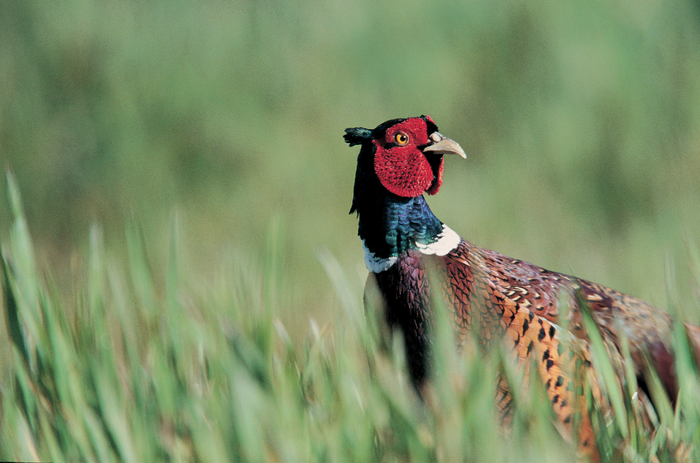Three years into a five-year pledge to completely phase out lead shot in UK game hunting, a Cambridge study finds that 94% of pheasants on sale for human consumption were killed using lead.

Credit: Andy Hay, RSPB
Three years into a five-year pledge to completely phase out lead shot in UK game hunting, a Cambridge study finds that 94% of pheasants on sale for human consumption were killed using lead.
The pledge, made in 2020 by nine major UK game shooting and rural organisations, aims to protect the natural environment and ensure a safer supply of game meat for consumers. Lead is toxic even in very small concentrations, and discarded shot from hunting poisons and kills tens of thousands of the UK’s wild birds each year.
A Cambridge-led team of 17 volunteers bought whole pheasants from butchers, game dealers and supermarkets across the UK in 2022-23. They dissected the birds at home and recovered embedded shotgun pellets from 235 of the 356 pheasant carcasses.
The main metal present in each shotgun pellet was revealed through laboratory analysis – conducted at the Environmental Research Institute, University of the Highlands and Islands, UK. Lead was the main element in 94% of the recovered shot pellets; the remaining 6% were predominantly composed of steel or a metal called bismuth.
The results are published today in the Conservation Evidence Journal.
At the request of the Defra Secretary of State, the UK Health & Safety Executive assessed the risks to the environment and human health posed by lead in shots and bullets. Their report proposes that the use of lead ammunition be banned, and this is currently under review. While remaining committed to phasing out lead shot voluntarily, many shooting organisations do not support the proposed regulatory restrictions.
“If UK game hunters are going to phase out lead shot voluntarily, they’re not doing very well so far,” said Professor Rhys Green in the University of Cambridge’s Department of Zoology, first author of the study.
He added: “The small decrease in the proportion of birds shot with lead in the latest UK shooting season is nowhere near on track to achieve a complete transition to non-toxic ammunition in the next two years.”
This is the third consecutive year the team has conducted the analysis. Their latest study shows a small improvement on the 2021/22 and 2021/20 shooting seasons, when over 99% of the pheasants studied were shot using lead ammunition.
In separate initiatives, some suppliers of game meat for human consumption – including Waitrose & Partners – have voluntarily announced their intention to stop selling game killed using lead shot. An assurance scheme has also been launched to encourage suppliers and retailers to facilitate the transition.
The team did not find any pheasant on sale in Waitrose in 2022/23 despite repeated visits to 15 different stores. Waitrose staff reported that the company had not been sufficiently assured by any supplier in 2022/23 that all pheasants had been killed using non-lead ammunition.
“Waitrose is the only retailer we know of fully complying with the pledge not to supply pheasant killed using lead, but it’s only managing this by not selling any pheasant at all,” said Green.
Steel shotgun pellets are a practical alternative to lead, and the vast majority of shotguns can use them or other safe lead-free alternatives. Shooting magazines and UK shooting organisations have communicated positive messages for three years about the effectiveness and practicality of non-lead shotgun ammunition.
Shooting and rural organisations – including the British Association for Shooting and Conservation and the Game and Wildlife Conservation Trust – have consistently provided information and detailed guidance to encourage the transition from lead to non-lead ammunition since 2020.
“Denmark banned lead shotgun ammunition in 1996, and a successful transition was made to steel and bismuth. It’s safer for the environment and gives game shooting a better image,” said Green.
A previous study led by Green found that pheasants killed by lead shot contain many fragments of lead too small to detect by eye or touch, and too distant from the shot to be removed without throwing away a large proportion of otherwise useable meat. This means that eating pheasant killed using lead shot is likely to expose consumers to raised levels of lead in their diet, even if the meat is carefully prepared to remove whole shotgun pellets and the most damaged tissue.
Lead has been banned from use in paint and petrol for decades. It is toxic to humans when absorbed by the body and there is no known safe level of exposure. Lead accumulates in the body over time and can cause long-term harm, including increased risk of cardiovascular disease and kidney disease in adults. Lead is known to lower IQ in young children, and affect the neurological development of unborn babies.
Article Title
Voluntary transition by hunters and game-meat suppliers from lead to non-lead ammunition: changes in practice after three years
Article Publication Date
27-Feb-2023




